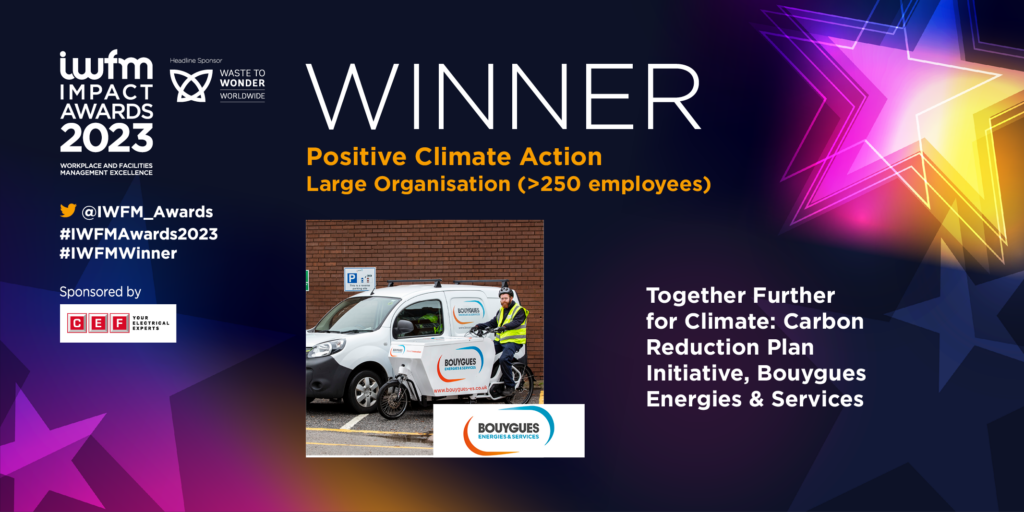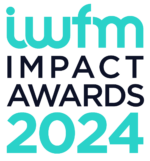Winner: Together Further for Climate: Carbon Reduction Plan Initiative, Bouygues Energies & Services
Sponsored by: CEF

FM firm Bouygues E&S has ambitious targets of achieving net zero for Scope 1 and 2 emissions by 2025, and cutting Scope 3 emissions by 30 percent by 2030. This has seen a particular focus on reducing emissions and improving sustainability on its healthcare sites.
In 2021, the company CEO tasked teams with developing a carbon reduction plan (CRP) for each contract, to be developed in line with the objectives of each NHS Trust. Staff undertook climate change training sessions to ensure they were able to deliver programmes. They also received ‘Climate Fresk’ training, designed to educate them on the issues associated with atmospheric greenhouse gases. In time, the aim is to roll this out to all employees.
Working closely with clients, the CRPs have led to several significant interventions. These have included biodiversity projects, switching from diesel to electric vans where possible, replacing vans with e-cargo bikes (now used on two-thirds of healthcare sites) and making use of AI to help reduce food waste.
A decision was also taken to install intelligent metering in premises, with the intention of achieving this on 80 percent of contracts, at no cost to clients. This would enable the business to identify types of connected equipment and provide real-time audits, allowing it to monitor usage and measure the impact its CRP initiatives were having.
The company also hosts an annual sustainability conference for its clients and suppliers, designed to share best practice. Particularly notable initiatives are included in its Best Practice Guides, which now cover topics such as energy and carbon in buildings, water usage and biodiversity.
It already had an energy-focused FM strategy, encouraging staff to take simple but impactful interventions that would make a difference, such as closing windows, switching off lights in empty rooms and turning off taps when not in use. This has also been re-energised, with the number of interventions recorded across the NHS portfolio standing at more than 10,000 a month.
The business is now looking to roll out a similar approach to that adopted in its healthcare clients to other sectors. The energy projects team is also exploring the possibility of new technology, such as hydrogen-powered floodlighting, which is already being used in Barnet Hospital.
Results gleaned
Individual initiatives in different NHS trusts have had notable impacts. At University Hospital Lewisham, replacing a diesel generator used to power a stand-in chiller with a new 3-phase supply led to an estimated annual saving of between 79 and 300 tonnes of CO2 a year.
A similar project at North Middlesex University Hospital led to a 74 percent reduction in energy usage at peak load and a saving of 72 tonnes of CO2, saving the trust over £2,000 a month in the cooling season. Phasing out fluorescent lamps with LEDs has also reduced energy consumption from these devices by 93 percent.
At a corporate level, Bouygues E&S’s Scope 1 and 2 carbon emissions have fallen since 2020 by 16 percent from 2,245 tonnes to 1,882 tonnes. Its Scope 3 emissions have been reduced by 37 percent, from 91,180 tonnes to 57,102 tonnes.
Best practice learning point
The experience of working across different clients has illustrated the lack of resources and internal expertise in many organisations, and the need to raise awareness and share knowledge. Understanding the unique challenges clients face is vital in developing the correct strategies, training and communications.
Key quotes
“I am impressed by the team and their efforts to push best practice through their work in areas such as energy interventions. The education it gives our operational teams coupled with the added value to our clients is unmatched.”- Glynn Newby, operations director, Bouygues E&S
“A fundamental part of our service delivery process included evaluating our contribution to each client’s Scope 3 footprint.”
